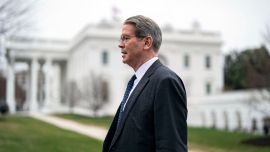Argentina’s government announced January 28 the outlines of an initial agreement with the International Monetary Fund, but there’s still plenty of obstacles to overcome before sealing the deal.
Talks made major headway and led officials to announce an understanding on key issues including the pace of government spending and Central Bank money-printing. Still, the broad outlines left many questions open on the specifics of the agreement as Argentina looks to reschedule payments on about US$40 billion from a previous programme.
Here are some of the remaining obstacles that analysts and investors are going to look to see answered.
Political Divisions
President Alberto Fernández, who governs a wide Peronist coalition, is facing the challenge that its more radical left-wing portion won’t support the deal in Congress, where he needs approval before sending it to the IMF’s board. He faced an early setback this week when Máximo Kirchner, the son of Vice-President Cristina Fernández de Kirchner, resigned from his leadership post in Congress, citing his disagreement over the deal.
“This also leaves Fernández in an extremely weak position,” Daniel Kerner, managing director for Latin America at consulting firm Eurasia Group, said. “He could back down and toughen his stance with the IMF, but that would make a deal more difficult.”
The vice-president herself hasn’t commented on the tentative agreement, but some of her allies openly suggested that defaulting on the IMF wouldn’t be so bad. On top of that, Fernández will also need support from opposition senators, some of whom have said that if the vice president doesn’t explicitly back the deal, they won’t discuss it either.
The government wants to finalise a deal before late March, when a US$2.9-billion payment comes due, after reaching a staff-level agreement sometime this month.
Currency Policy
Fernandez emphasised there won’t be a devaluation as part of the preliminary accord reached with the IMF, with Economy Minister Martín Guzmán adding that Argentina will continue with the government-administered currency policy in place.
With currency controls enforced since 2019, the main parallel exchange rate trades at more than double the official peso, which is controlled through a crawling peg. This gap adds pressure on price expectations – inflation is running above 50 percent annually – and makes doing business harder for companies, large and small. Officials still haven’t explained their plan to close this gap.
There’s also a question of whether the staff-level agreement will include any mentions of unwinding the wider controls, which include a cobweb of restrictions including banning Argentines to legally exchange more than US$200 a month.
Energy Subsidies
IMF leadership says the government has agreed to gradually decrease its energy subsidies, which in 2021 were nearly US$11 billion. But there’s still no details on how exactly that process will be carried out, and raising prices may be the most politically sensitive decision in Argentina’s IMF deal.
Polls show that low-income Argentines equate government-regulated price hikes on electricity and water bills to a tax increase. Before the agreement, the government was planning for utility prices to only rise as much as 20 percent this year, even with inflation expectations remaining above 50 percent.
Government Financing
Argentina’s Central Bank has accumulated over 4.8 trillion pesos (US$45.6 billion) of short-term debt. A detailed plan to unwinding that will almost certainly be part of the “appropriate monetary policy” that IMF officials say is important for the deal to succeed.
IMF staff have also called for interest rates to exceed inflation. It’s unclear how quickly the central bank, which isn’t independent from the government, plans to move the current benchmark rate, which stands at 40 percent, above annual inflation. But higher interest rates – and payments – risk expanding the debt load and hurting activity.
Sustainability
Overall, the big question mark is if the new programme, the 22nd between Argentina and the IMF, is solid enough to avoid the fate of previous arrangements, which failed to lift the crisis-prone economy.
Since Argentina has requested a plan known as an Extended Fund Facility, the arrangement is likely to require some so-called structural reforms from the country. The government has already said that some of the policy changes included in past IMF deals, such as a labor reform, privatisation of national assets or pension redesign, won’t be required this time. That leaves Argentina watchers wondering what both parties will agree on as main policy tools to change the course of the economy.
For the IMF, accepting a less stringent programme would be a way of avoiding the conditionality that in previous occasions ended up hurting its arrangements with Argentina from a political perspective.
related news
by Patrick Gillespie, Bloomberg





















Comments